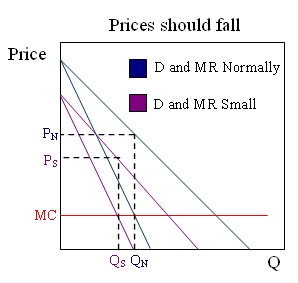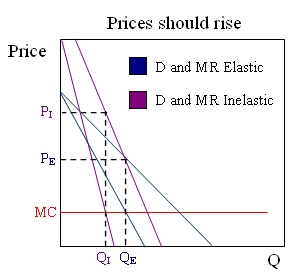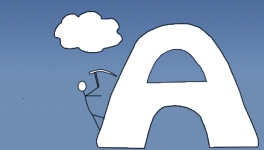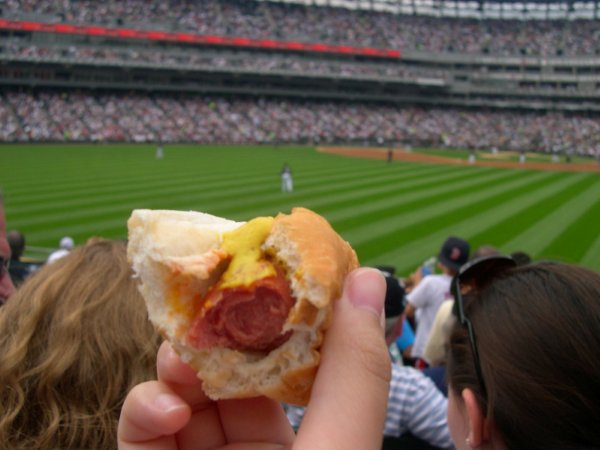« Lessons from My Laundromat | Main | Rape Statistics: 1 in 4? »
Hot Dog Pricing Paradox
By Chris | September 9, 2009
Over Labor Day weekend I visited Chicago and spent Sunday afternoon watching Boston pummel the White Sox. Walking into the ballpark I had noticed a stand selling premium Chicago-style hot dogs with all of the fixings. While I was tempted, the ballpark level prices dissuaded me. Fortunately, on this particular day the ballpark was running a $1.00 hot dog promotion. I have seen similar promotions at other sporting venues. The hot dogs are bare bones: cheap meat, a small bun, served plain, with ketchup and mustard available. As I devoured my frugal treat, I began to think about the impact of the $1.00 promotion on the vendor selling premium Chicago-style hot dogs. Assume that the vendor is a profit maximizing monopolist with no direct competition and the freedom to change its price. Cheap hot dogs are an imperfect substitute and they normally cost $2.50. On $1.00 hot dog days, should the premium hot dog vendor raise or lower its price to maximize profit? The answer is under the fold.
It depends. There are two countervailing effects and it depends on which one dominates. Each effect is described and graphically represented below.

Price should fall:
Cheap hot dogs and Chicago-style hot dogs are substitutes. When the price of cheap hot dogs falls, demand for substitutes should decrease. When demand falls, a profit-maximizing monopolist should lower its price.
 Price should rise:
Price should rise:
Demand will become more inelastic. The people still interested in buying Chicago-style hot dogs when such a cheap alternative is available aren’t very price sensitive. Maybe they are tourists looking to get the Chicago experience or successful Deloitte IT consultants with an expense card. The vendor should raise its price since the customers it has left aren’t very sensitive to price.
Which effect dominates? That’s debatable. I wasn’t able to go to multiple games to see if the prices did indeed change. But, I was surprised that Chicago-style hot dogs were selling for a quite reasonable $3.00. That was cheaper than you could get them along the Lake. Maybe they’re always that cheap, but I wouldn’t be surprised if the vendor lowers its price on dollar hot dog day. My vote is that the substitution effect dominates.
Topics: Economics, Food, Markets | 3 Comments »




January 8th, 2012 at 11:51 am
If the Red Sox were in town to play the White Sox the ticket sales must have been very good, and isn’t the purpose of the low priced hot dogs to draw people to the stadium (other examples: dollar beer, free tshirts, etc.)? Therefore it is not logical in the first place to have the dollar hot dogs.
July 11th, 2014 at 12:13 am
We are a gaggle of volunteers and opening a brand new scheme in our community.
Your ite provided us with helpful information to work on. You’ve done a foormidable
process and our entire neighborhood will be thankful to you.
April 22nd, 2015 at 8:41 am
It’s amazing to go to see this site and reading the views of all colleagues on the topic of this
piece of writing, while I am also zealous of getting familiarity.